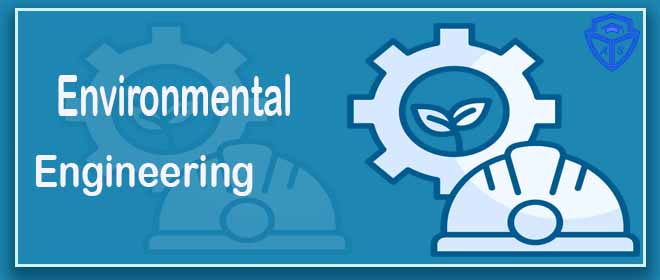
Environmental Engineering
Updated On 28 Mar,2025

Environmental Engineering is a multidisciplinary field focused on sustainability, pollution control, waste management, and environmental protection. It combines principles of engineering, chemistry, biology, and geology to solve environmental challenges like climate change, water pollution, and renewable energy development.
Why Choose Environmental Engineering?
| Benefits | Details |
|---|---|
| High Demand | Growing industry in sustainability and pollution control. |
| Global Scope | Opportunities in government, private, and research sectors. |
| Diverse Career Paths | Work in environmental consulting, policymaking, and industrial sustainability. |
| Growing Industry | Rising need for renewable energy and climate change solutions. |
Eligibility Criteria for Environmental Engineering
Educational Requirements
10+2 (PCM) with a minimum 50-60% marks (varies by institution).
Relaxation for SC/ST/OBC: 40-50% in some institutions.
Age Limit
Minimum Age: 17 years.
Maximum Age: Varies depending on the exam and institution.
Entrance Exams for Environmental Engineering Admission
Comparison of Entrance Exams
| Exam | Institutes Covered | Exam Level | Mode of Exam |
|---|---|---|---|
| JEE Main & JEE Advanced | IITs, NITs, IIITs | National | Computer-Based |
| BITSAT | BITS Pilani, Goa, Hyderabad | University-Level | Computer-Based |
| VITEEE | VIT University | University-Level | Online |
| MHT CET | Maharashtra Engineering Colleges | State-Level | Online |
| WBJEE | West Bengal Colleges | State-Level | Offline |
| KCET | Karnataka Engineering Colleges | State-Level | Offline |
Top Colleges for Environmental Engineering in India
Best Institutes Offering Environmental Engineering
| Category | Colleges |
|---|---|
| Top IITs | IIT Bombay, IIT Delhi, IIT Kharagpur, IIT Kanpur |
| Best NITs | NIT Trichy, NIT Warangal, NIT Surathkal |
| State Universities | Jadavpur University, DTU, Anna University |
| Private Universities | BITS Pilani, VIT Vellore, SRM University |
Top Environmental Engineering Institutions Worldwide:
- ETH Zurich – Swiss Federal Institute of Technology: https://ethz.ch/en.html
- Stanford University: https://www.stanford.edu/
- University of California, Berkeley (UC Berkeley): https://www.berkeley.edu/
- Delft University of Technology (TU Delft): https://www.tudelft.nl/en/
- University of Queensland: https://www.uq.edu.au/
Specializations in Environmental Engineering
Trending Specializations
| Specialization | Focus Area |
|---|---|
| Water Resource Engineering | Water supply management and wastewater treatment. |
| Air Pollution Control | Systems for reducing air pollution emissions. |
| Solid Waste Management | Recycling, landfill management, and waste disposal. |
| Environmental Impact Assessment | Analyzing industrial effects on ecosystems. |
| Renewable Energy & Sustainability | Solar, wind, and biofuel energy research. |
Career Opportunities in Environmental Engineering
Projected Job Growth (2025-2030)
Government sector: CPCB, MoEF, Pollution Control Boards.
Private sector: TCS, L&T, Reliance, Wipro.
International organizations: WHO, UNDP, Greenpeace.
Job Roles & Average Salaries
| Job Role | Average Salary (INR LPA) |
|---|---|
| Environmental Engineer | ₹4-12 LPA |
| Sustainability Consultant | ₹5-15 LPA |
| Pollution Control Officer | ₹6-10 LPA |
| Water Resource Engineer | ₹4-9 LPA |
| Climate Change Analyst | ₹5-12 LPA |
Admission Process for Environmental Engineering
Step-by-Step Guide
1️⃣ Choose the Right Entrance Exam (JEE, state exams, private university tests).
2️⃣ Apply Online on official exam portals.
3️⃣ Prepare for the Exam (NCERT books, coaching, mock tests).
4️⃣ Appear for the Exam and secure a good rank.
5️⃣ Participate in Counseling to select preferred colleges.
6️⃣ Document Verification & Admission Confirmation to finalize enrollment.
Scholarships & Financial Aid
| Scholarship | Offered By | Eligibility |
|---|---|---|
| Central Sector Scholarship | Government of India | Meritorious students |
| AICTE Pragati Scholarship | AICTE | Female students |
| Reliance Foundation Scholarship | Reliance Group | Engineering students in sustainability fields |
Future Scope of Environmental Engineering
Top Trends in the Industry
- Smart Waste Management – AI & IoT integration for waste control.
- Climate Change Adaptation – Risk assessment infrastructure.
- Water Scarcity Solutions – Innovations in desalination.
- Green Building Design – Sustainable architecture.
- Expected Industry Growth
Growth of Environmental Engineering Industry
Annual Growth Rate: 7-9% due to climate regulations.
Major Investments in renewable energy & green tech.
FAQs about Environmental Engineering Admission
What is the difference between Environmental Engineering and Civil Engineering?
Environmental Engineering focuses on pollution control, sustainability, and waste management, while Civil Engineering primarily deals with construction and infrastructure.
Which entrance exam is best for Environmental Engineering?
JEE Advanced for IITs, BITSAT for BITS Pilani, and VITEEE for VIT University.
What is the starting salary for an Environmental Engineer?
₹4 LPA to ₹12 LPA, depending on the specialization and employer.
Is Environmental Engineering a good career choice?
Yes, with increasing government regulations, corporate sustainability goals, and global environmental concerns, the field offers diverse job opportunities.
Can I get into Environmental Engineering without JEE?
Yes, many private universities like SRM, Manipal, and UPES Dehradun offer direct admission.
Final Thoughts
Environmental Engineering is a high-potential field with diverse opportunities in climate action, pollution control, and sustainability. With rising global environmental challenges, the demand for skilled professionals is increasing rapidly.
For more admission updates and career guidance, stay tuned to Admission Solver!